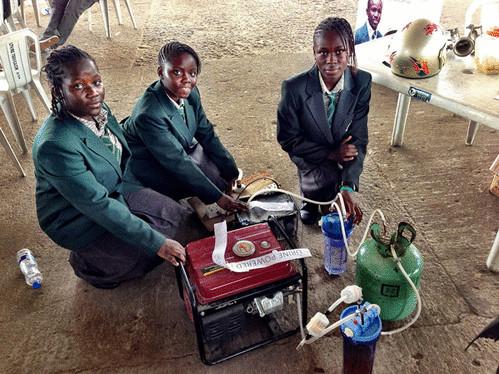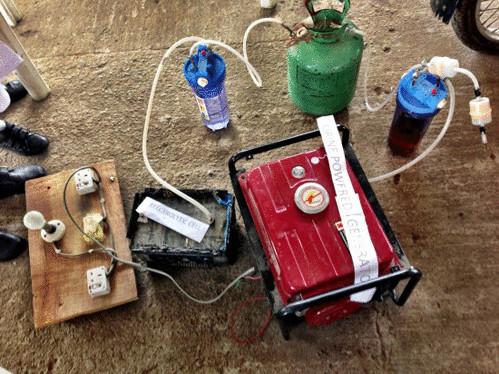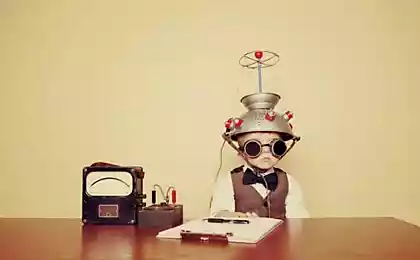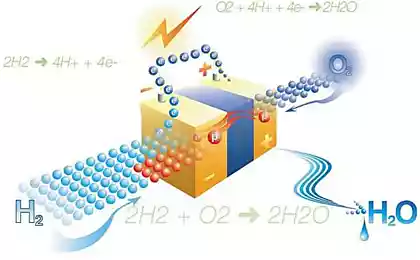433
6 hours of electricity in one trip to the toilet
Who says teenage girls don't like science? Four enterprising girls from Nigeria broke the stereotype by inventing an electricity generator that runs on urine....
Even given the fact that Nigeria's economy is on the rise, more than half of the 162 million citizens of this country do not have access to electricity, and even those who have not can be sure that electricity is every day.
The Federal government has taken steps to improve the situation – privatizing all of the plant and planned work on modernization and upgrading of equipment.

However, four teenage girls couldn't wait, and I found his solution to the problem of energy supply. As a resource the girls it was decided to use a free, unlimited, readily available, and not dependent on government material.
Fourteen girls duro-Aina Adebola (Duro-Aina Adebola, Akindele Abiola), Akindele Abiola (Abiola Akindele), Falik Oluwatoyin (Faleke Oluwatoyin) and fifteen-year-old Bella Eniola (Bello Eniola) demonstrated his invention at the exhibition of devices that are hand made (Maker Faire Africa), which took place in Lagos on November 5-6. By the way, it's more than just an exhibition of new projects: new technologies are being actively discussed and the best ones find a place in life.

According to the project, urine is put into an electrolytic cell, which decomposes urea (urea) to nitrogen, water and hydrogen. The hydrogen passes through the water filter and then is pumped through a container of liquid boric acid, which is used to remove moisture from hydrogen gas. This purified hydrogen into the generator and as a result, one litre of urine provides six hours of electricity.
Although the idea of using human waste as an energy source itself is very attractive, the prototype device has a number of potential problems that need to be addressed before the idea will become a reality.
Urea electrolysis for hydrogen production requires electricity. Because of this, urine can not be used to generate electricity in areas with a complete lack of power.
"It's a great idea and, of course, it's nice to see people working to convert human waste into something really useful. This is definitely the most unexpected projects, but given the requirements, I would be surprised if the overall result of the project would be positive," said Oliver Warr (Oliver Warr), a researcher at the University of Manchester (University of Manchester). "If there was an alternative method of producing hydrogen, such as microbial, it would be better."

"The composition of urine is urea," explains Warr. "It is also high in salt. Electrolise salt water creates more hydrogen as well as chlorine, which can combine with hydrogen, forming hydrochloric acid is not the best conditions for longevity of the generator"
All this, and the issues associated with the complexities of safe hydrogen storage can not guarantee a successful future device. But, undoubtedly, this project demonstrates the potential of using the abundant resources of human life to create a useful product. Let's hope that the project will find its investor, and such a useful idea will ever get implemented.
Source: /users/104
Even given the fact that Nigeria's economy is on the rise, more than half of the 162 million citizens of this country do not have access to electricity, and even those who have not can be sure that electricity is every day.
The Federal government has taken steps to improve the situation – privatizing all of the plant and planned work on modernization and upgrading of equipment.

However, four teenage girls couldn't wait, and I found his solution to the problem of energy supply. As a resource the girls it was decided to use a free, unlimited, readily available, and not dependent on government material.
Fourteen girls duro-Aina Adebola (Duro-Aina Adebola, Akindele Abiola), Akindele Abiola (Abiola Akindele), Falik Oluwatoyin (Faleke Oluwatoyin) and fifteen-year-old Bella Eniola (Bello Eniola) demonstrated his invention at the exhibition of devices that are hand made (Maker Faire Africa), which took place in Lagos on November 5-6. By the way, it's more than just an exhibition of new projects: new technologies are being actively discussed and the best ones find a place in life.

According to the project, urine is put into an electrolytic cell, which decomposes urea (urea) to nitrogen, water and hydrogen. The hydrogen passes through the water filter and then is pumped through a container of liquid boric acid, which is used to remove moisture from hydrogen gas. This purified hydrogen into the generator and as a result, one litre of urine provides six hours of electricity.
Although the idea of using human waste as an energy source itself is very attractive, the prototype device has a number of potential problems that need to be addressed before the idea will become a reality.
Urea electrolysis for hydrogen production requires electricity. Because of this, urine can not be used to generate electricity in areas with a complete lack of power.
"It's a great idea and, of course, it's nice to see people working to convert human waste into something really useful. This is definitely the most unexpected projects, but given the requirements, I would be surprised if the overall result of the project would be positive," said Oliver Warr (Oliver Warr), a researcher at the University of Manchester (University of Manchester). "If there was an alternative method of producing hydrogen, such as microbial, it would be better."

"The composition of urine is urea," explains Warr. "It is also high in salt. Electrolise salt water creates more hydrogen as well as chlorine, which can combine with hydrogen, forming hydrochloric acid is not the best conditions for longevity of the generator"
All this, and the issues associated with the complexities of safe hydrogen storage can not guarantee a successful future device. But, undoubtedly, this project demonstrates the potential of using the abundant resources of human life to create a useful product. Let's hope that the project will find its investor, and such a useful idea will ever get implemented.
Source: /users/104























